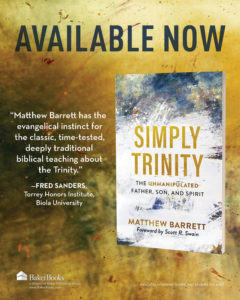
The Tragedy of Chronological Snobbery
T he older I get, the more often I find myself coming back to the wisdom of C.S. Lewis. For those who have been immersed in his writings for years, his ever-relevance produces a renewable sense of amazement. He seems to speak out from his mid-twentieth century grave directly to so many of our pressing questions. One question of increasing relevance is this: should we follow the critically appropriated metaphysic of Christian-Platonism or the uncritically assumed metaphysic of Hegelianism. I am convinced the secret to Lewis’s constant prescience is his timelessness. This approach can be summed up in the grave warning to avoid “chronological snobbery”—the stickiest of his coined phrases.
he older I get, the more often I find myself coming back to the wisdom of C.S. Lewis. For those who have been immersed in his writings for years, his ever-relevance produces a renewable sense of amazement. He seems to speak out from his mid-twentieth century grave directly to so many of our pressing questions. One question of increasing relevance is this: should we follow the critically appropriated metaphysic of Christian-Platonism or the uncritically assumed metaphysic of Hegelianism. I am convinced the secret to Lewis’s constant prescience is his timelessness. This approach can be summed up in the grave warning to avoid “chronological snobbery”—the stickiest of his coined phrases.
Learning Like Lewis
I recently listened to a lecture on Thomas Aquinas and Natural Theology that, if it were possible, made my affections for Lewis rise even more. I must give Lewis the credit. For I knew the scholar had a different take on Aquinas than I did, and I entertained the idea of passing on the lecture altogether. But then I thought, “What would C.S. Lewis do?” He would likely listen with an open mind, ready to engage to the best of his ability, and probably follow up with a written piece engaging with the lecture’s content. So, here we are.
Lewis didn’t just get me to listen, though. He kept coming up throughout. Not by the speaker, but in my mind, almost in conversation with the speaker. I would like to believe that I gave the speaker a fair shake, but when Aristotle and Aquinas were cast as proto-Enlightenment thinkers, locked and loaded with Empiricism-like methodological commitments, I confess I was unable to keep the question of anachronism at bay. And when a thread began to develop between Aristotle, Aquinas, Descartes, Locke and (for the kicker) Marx—the thread being the claim that all of these men are examples of what happens when you detach your epistemology from revelation; that sticking with Aristotle will consistently get you to godless therapy and contemporary “woke social justice”—the booming voice of that Oxford don thundered through my head, “This is a stunning display of chronological snobbery. It’s all in Plato, all in Plato: Bless me, what do they teach them at these schools?”
If God has made himself known in nature, then certain things about him must be deducible from nature. Click To Tweet Now, far be it for me to question this critic’s sincerity. I am sure he is an earnest, faithful brother in Christ, and I don’t doubt him when he said that he read the Summa five times, or when he said he has consulted the major Thomistic scholars of the past couple centuries. But those facts in themselves don’t offer any assurance that chronological snobbery is out of his reach. In fact, it was hard to avoid the conclusion that chronological snobbery was at work the way Aquinas was patted on the head, in patronized fashion, “He was a very brilliant man… the poor fellow just couldn’t start at the right place.”
Aquinas and Revelation
Upon further inspection, however, the primary charge just would not stick. The charge, if I could sum up the point in the talk, was that Aquinas attempted to know God apart from the foundation of revelation. And no, said the speaker, you cannot call Aquinas’s pursuit of natural theology an investigation of general revelation. This is because his definition of general revelation requires immediacy—people know that there is a God, and they suppress the truth about him in unrighteousness (Rom 1:18). God, the listeners were reminded, has made himself known: “his invisible attributes, namely, his eternal power and divine nature, have been clearly perceived, ever since the creation of the world, in the things that have been made. So, they are without excuse” (Rom 1:20).
The problem is, I don’t see Aquinas disagreeing with the insistence that God’s self-revelation in nature renders man’s unbelief inexcusable. That is the whole point of natural theology: if God has made himself known in nature, then certain things about him must be deducible from nature. The hang-up seems to be on this term “immediacy.” It is certainly true that Aquinas would reject the notion that all human beings are born pre-loaded with a complete knowledge of God apart from experiencing his self-revelation in nature, but then so would the aforementioned speaker. In fact, he went on to grant that the immediacy of general revelation—whatever he does mean by it—does not imply that we fail to experience this revelation through our senses and rationality. It is true that God reveals himself through day and night (Ps 19:1-6), but that at least implies that getting the message requires the minimum of experiencing one whole day.
Aquinas seems to be saying no more and no less about what one can deduce from natural theology than what this critic claimed could be learned from general revelation: namely, enough knowledge about God to condemn unbelievers, but not enough to save them. So, how is Aquinas’s employment of reason as an effort to grapple with the nature of God via contemplation of the “things that have been made” different than an effort to understand general revelation? I cannot come up with an answer. The best I can do is guess that it has something to do with the presence of a formal syllogism, and too much language about “reason.”
Van Til’s Happy Trigger-Finger
When you try to step into a world of epistemological neutrality, you are actually stepping into the world of skepticism. Click To Tweet What’s going on here? As much as it pains me to say it, I have to blame one of my heroes, Cornelius Van Til. It is difficult for me to articulate how much appreciation I have for this saint: Van Til came along at a formative point of my life and effected one of those paradigm-shifts that the average person receives only a handful of times. The chief insight he brought to light was the all-important fact: neutrality is a myth. He was absolutely right when he confronted the evidentialist apologists of his day with the hypocrisy of their presuppositions. When you try to step into a world of epistemological neutrality, you are actually stepping into the world of skepticism. The unbeliever doesn’t disbelieve because he doesn’t have the evidence he requires; he disbelieves because he has a rebel heart. Letting the skeptic determine what constitutes as legitimate evidence for belief is to concede the debate from the outset—because of his makeup as covenant-breaking rebel, he will always rig the rules of engagement to leave the Christian God—the Triune God—off the table as a viable conclusion to the argument. It’s a foregone conclusion.
The problem is that Van Til took that criticism and started shooting it off in every direction. According to Van Til’s A Christian Theory of Knowledge, “early Christian theologians…all too frequently did not realize that once they agreed that their notion of incomprehensibility of God was the same, in effect, as the idea of the namelessness of God as held by the Greeks, the gnostics and Plotinus, that then they could logically be compelled to deny the whole of the significance of the appearance of Christ in history.” Even more specifically, “Augustine does not realize that in defending a bare theism, a theism alike acceptable to Christians and to non-Christians, he is precluding the possibility of going on to a defense of Christianity.” Van Til insists that the same error is inexplicably repeated down through the ages, not the least by Aquinas (one has to remind oneself that Van Til did not actually believe he was the first and only consistent Christian theologian after Paul, contrary to the impression he occasionally gives).
The whole notion of “Aquinas as proto-Enlightenment thinker” is something Van Til himself entertained and propagandized. In “Nature and Sripture” Van Til insists, “Thomas presents us with a sort of pre-Kantian deduction of the categories.” This was inevitable for Aquinas whose “uncritical assumption [of Aristotle]… vitiates the entire argument for the existence of God that he offers, and in fact vitiates his approach to every other problem in philosophy and in theology” (emphasis mine), since, according to Van Til’s The Defense of the Faith, “we cannot start with Aristotle without eventually falling prey to Kant.” Consequently, anyone who voices appreciation for Aquinas on natural theology is de facto guilty of the same intellectual mistake. This is why he cannot close his seminal work, The Defense of the Faith, without implicating Warfield and even Bavinck in this Enlightenment-like reliance on rationality: “It is this ever and everywhere present face of God [in general revelation] that Descartes virtually denied when he made the human self the ultimate starting point in predication. This was forgotten by the old Princeton Apologetics; it is also, for the moment, forgotten by Bavinck when he would start with the cogito as such as the foundation of human knowledge.”
Natural theology, for the best of the Great Tradition, was always “faith seeking understanding.” Click To Tweet This tunnel vision is frustrating for those of us who appreciate Van Til’s conceptual insights in the abstract, but who believe he misses the mark on their application in the particulars. For example, reading his essay, “Nature and Scripture” gives the experience of whiplash. Its first half is a harrowing description of general revelation—the kind of thing that I believe the old theologians of the Great Tradition would eat up, and take as an invitation to engage in natural theology to the glory of God. But when he turns his attention to critiquing natural theology in the essay’s second half, he anachronistically forces the old theologians’ natural theology-talk into the epistemological naturalism of Enlightenment thinkers and burns their whole project to crisps. The fact is, they would see much of themselves in his positive description of general revelation and would scratch their heads at his description of their supposed revelation-less epistemology. They believed in an enchanted cosmos that pulsated with revelation. Man, for them, was no blank slate, nor was he a ghost in the machine: he was a creature. Natural theology, for the best of the Great Tradition, was always “faith seeking understanding.”
This problem of reducing virtually all non-Van Tilians to Enlightenment thinkers has been made doubly difficult when you consider the fact that epistemological naturalists like William Lane Craig agreed with Van Til that Aquinas was a kind of proto-Lockean, and celebrated it! This eventuated in the muddled situation that many are trying to sort out right now: someone like William Lane Craig can deny the doctrine of divine simplicity, conceptualize the Trinity in near-tri-theistic fashion, rip Anselm out of his historical context, and own the title of a classicist. Meanwhile, Van Til and his followers look at someone like Craig and justly decry his whole project, but not without also decrying the classical tradition because they agree with him that he—and others like him—really are genuine inheritors of the classical tradition! And all the while, the actual Great Tradition is talked about but seldom engaged with.
Under this conception, it seems we must choose between the metaphysics of the Great Tradition or the soteriology of the Reformed Tradition, but that we may not have both. Is it possible to harmonize the Great Tradition’s metaphysic of “participation” with a Reformed soteriology? Answering this question clearly is certainly not made easier by the fact that some within the Reformed camp agree with the harsh choice between the metaphysic of the Great Tradition and the soteriology of the Reformed tradition.
Rejecting the False Choice
But is the option truly that stark? Must we decide between embracing the metaphysics of the Great Tradition, and consequently own a Roman (or even an Eastern Orthodox) soteriology, or embracing the Reformed soteriology and, with a heavy and reluctant heart, bid farewell to the gorgeous metaphysic of Christian-Platonism and settle in with the drab and colorless metaphysic of nominalism? Fortunately, no such choice is necessary, because those who would have us choose are mistaken to do so. It is, for one thing, a historically novel choice, since, as Stephen Duby notes in God In Himself, “the early Reformed certainly drew on the resources of medieval philosophy and theology in an eclectic manner,” but “essentially stood in continuity with Thomas’s approach [to metaphysics] and criticized Scotus’s doctrine of univocity,” and, we might add, nominalism. In fact, Richard Muller’s career—indeed his entire project!—has been spent proving the same (see his Post-Reformation Reformed Dogmatics).
The fact is, an epistemology of revelation (which is something that I—and I think Aquinas, for that matter—want to affirm) requires a metaphysic of realism. Click To Tweet The fact is, an epistemology of revelation (which is something that I—and I think Aquinas, for that matter—want to affirm) requires a metaphysic of realism. We can get that metaphysic from the Great Tradition if we would but receive it with gratitude and humility. This metaphysical realism comes to us from Plato, through Aristotle, through Medieval scholasticism, and is received by the post-Reformation scholastics and Puritans. This means that Van Til and many of his followers, including the lecturer who inspired this post, are not unlike Elijah, self-segregated and thinking themselves the few who remain jealous for the LORD. The invitation is for such individuals to look up and see a cloud of witnesses from the Great Tradition—to be reminded that God has, so to speak, preserved “seven thousand in Israel, all the knees that have not bowed to Baal, and every mouth that has not kissed him” (cf., 1 Kings 19:9-18).
The kind of authority the aforementioned speaker (rightly) insists we render to divine revelation (special and general) is made sense of only in the kind of metaphysic the same speaker rejects in his fundamental denunciation of Aquinas and the Great Tradition. Within this metaphysic, the cosmos pulsates with life and meaning. Creation is good because it is formed in the good mind of the all-good God. The material universe is not good despite its physical form; its physical form is itself good. But its physical form does not exhaust its essence. The cosmos means more than it is.
To come full circle, we see this metaphysic illustrated well by one of Christianity’s most widely recognized Christian Platonists (though he is seldom recognized as such), C.S. Lewis. He illustrates the point in a conversation between the Narnian star, Ramandu, and Eustace Scrubb in the fantasy classic The Voyage of the Dawn Treader:
“In our world,” said Eustace, “a star is a huge ball of flaming gas.”
“Even in your world, my son, that is not what a star is but only what it is made of.”
Lewis goes on to make explicit that his Narnian cosmology is Platonic in The Last Battle, when earth and Narnia are shown to be expressions of the “further up, further in” reality of Aslan’s country. It is Professor Digory who sums up the philosophical point with one last lesson for the Pevensies and their friends:
“Listen, Peter. When Aslan said you could never go back to Narnia, he meant the Narnia you were thinking of. But that was not the real Narnia. That had a beginning and an end. It was only a shadow or a copy of the real Narnia, which has always been here and always will be here: just as our own world, England and all, is only a shadow or copy of something in Aslan’s real world. You need not mourn over Narnia, Lucy. All of the old Narnia that mattered, all the dear creatures, have been drawn into the real Narnia through the Door. And of course it is different; as different as a real thing is from a shadow or as waking life is from a dream.” His voice stirred everyone like a trumpet as he spoke these words: but [then] he added under his breath “It’s all in Plato, all in Plato: bless me, what do they teach them at these schools!”
Within this kind of gratuitous cosmology, wherein the referent of any created thing is not the thing itself, but its God. Meaning transgresses the boundaries of all creaturely subjects and find their home in the ultimate Subject. Everything is revelation, and thus contemplation of the relationship between the world and its Maker is the furthest thing from fruitless speculation. It is the full-bodied embrace of reality.

